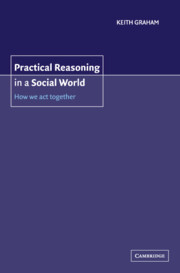Book contents
- Frontmatter
- Contents
- Preface
- Acknowledgements
- Introduction
- 1 Practical reasoning in context
- 2 The indistinctness of persons: causal interconnection
- 3 The indistinctness of persons: the personhood of collectivities
- 4 Practical collective identification and dissociation
- 5 Practical reasoning: sources and constraints
- 6 Practical reasoning and morality
- Conclusion
- Bibliography
- Index
Introduction
Published online by Cambridge University Press: 22 September 2009
- Frontmatter
- Contents
- Preface
- Acknowledgements
- Introduction
- 1 Practical reasoning in context
- 2 The indistinctness of persons: causal interconnection
- 3 The indistinctness of persons: the personhood of collectivities
- 4 Practical collective identification and dissociation
- 5 Practical reasoning: sources and constraints
- 6 Practical reasoning and morality
- Conclusion
- Bibliography
- Index
Summary
This book has the immodest aim of saying something significant about how human beings should behave. Or, to speak more cautiously, the aim is to say something about how a proper understanding of ourselves and our circumstances should make a difference to our practical reasoning. (I use the latter phrase throughout the book in a wholly non-technical sense.) In particular, I want to explore how the reasons we have for acting are affected by the simple thought that we are social creatures. Whenever we act, either singly or in collaboration, we act together. My aim is to introduce some philosophical precision into that thought and to increase our understanding of why it is true and why it matters.
When I speak here of the reasons we have for acting, I refer to normative rather than explanatory reasons: that is, reasons which constitute considerations in favour of particular courses of action, reasons why agents ought to act in particular ways, reasons which are good or bad, rather than reasons which account for why agents do act or have acted in particular ways. My concern is with the general category of normative reasons for acting rather than with any sub-category. I am not concerned in any special way with moral reasons. These are one but only one kind of normative reason; there are also, for example, prudential and legal normative reasons, and no doubt many other kinds which are not so easily categorised.
- Type
- Chapter
- Information
- Practical Reasoning in a Social WorldHow We Act Together, pp. 1 - 10Publisher: Cambridge University PressPrint publication year: 2002

